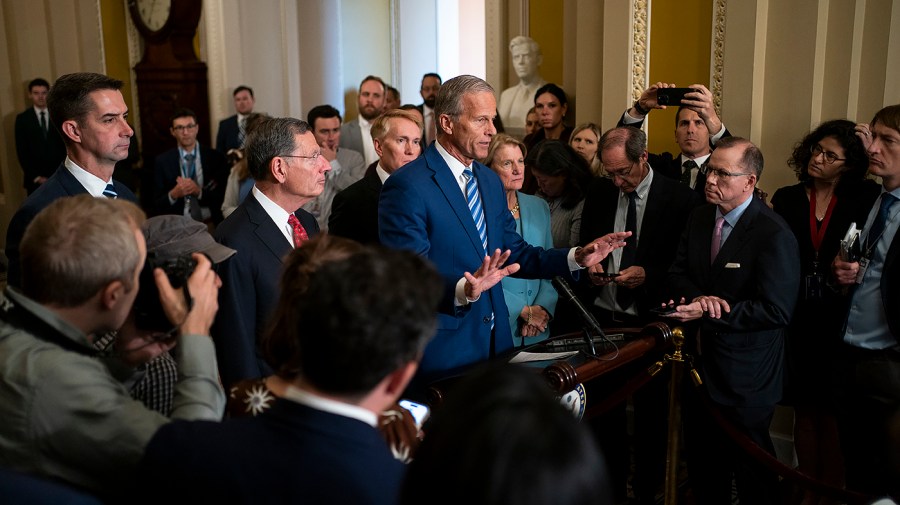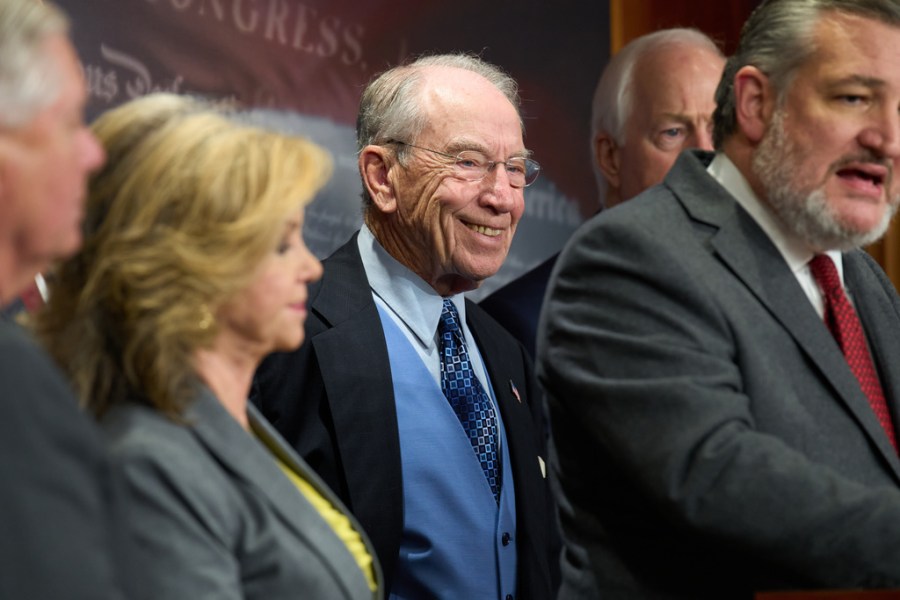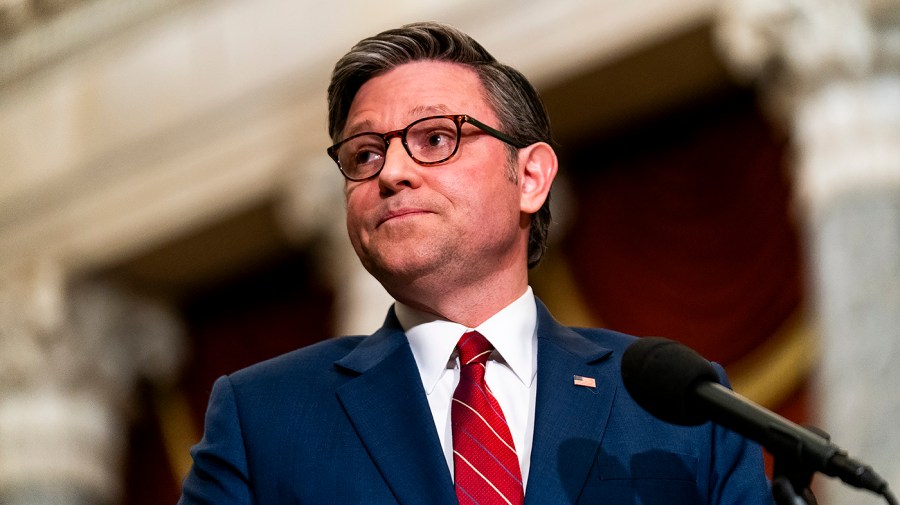
Senate Majority Leader John Thune (R-D) and his Republican leadership team are exploring new ideas to end the 38-day government shutdown. became clear on friday The strategy of pressuring Democrats to vote for a House-passed funding bill has failed so far.
Senate Republicans are considering various ideas to break the impasse, such as voting on a new Senate-drafted bill that would fund a larger portion of the federal government through fiscal year 2026.
This approach, supported by Appropriations Committee members, would involve voting on three regular appropriations bills that passed the Senate with strong bipartisan support earlier this year and have been vetted with House Republicans.
Another idea, promoted by Sen. Lindsey Graham (R-S.C.), is to unveil a Republican-drafted bill that would try to reduce rising health care costs — tackling the issue at the center of the fight over government funding.
A third proposal, promoted by Senator Eric Schmitt (R-Mo.), is to encourage the Trump administration to raid federally funded projects in Democratic states like California and New York to find extra money to pay active-duty members of the military and air traffic controllers during the shutdown.
Senate Republican leaders are looking for new strategies to end the shutdown as rank-and-file GOP lawmakers grow tired of repeatedly voting on a House-passed clean continuing resolution to fund the government through Nov. 21.
Senate Democrats have blocked the House-passed bill 14 times, and Thune has been unable to increase the number of Democrats supporting the measure despite repeated pleas to his colleagues.
“There’s no reason to vote on the same thing we voted to do in the past again,” Sen. Mike Rounds (R-S.D.) told reporters Friday.
So far, only three members of the Senate Democratic caucus have voted for a clean continuation resolution that does not include language on extending expiring Affordable Care Act (ACA) subsidies: Sens. John Fetterman (D-Pa.), Catherine Cortez Masto (D-Nev.) and Angus King (Maine), an independent who caucuses with Democrats.
Senate Republicans on the Appropriations Committee, led by Chairwoman Susan Collins (R-Maine), have tried to break the impasse by trying to entice Democrats to vote for a “mini-bus” appropriations package that would fund military construction, Veterans Affairs, the Department of Agriculture and the legislative branch through fiscal year 2026.
The chairmen of the Senate and House Appropriations committees met Friday afternoon to finalize the package, in hopes that if it passes the Senate it can be quickly approved in the House.
“From my vantage point, I still think it is a viable option to bring some of our fellow appropriators to the other side [of the aisle] To join us in voting for CR by attaching a three-bill mini-bus and going over the appropriations bills,” said Sen. John Hoeven (R-N.D.), a member of the appropriations panel who has been deeply involved in negotiations with Democratic centrists.
Hoeven acknowledged that Senate Democratic leader Chuck Schumer (NY) would not agree to move forward with the appropriations package without extending expiring health insurance subsidies.
“There has been a breakdown in leadership and the American people are paying the price because of Schumer and the leadership, and obviously people who want to run for president are using this as a leverage game,” he said. “I don’t know if their leadership will ever come, but I think there are pragmatic Democrats who want to join us.”
Thune told reporters Friday afternoon that he expected the text of the revised appropriations package to be posted in time for action over the weekend. He said it was unclear what issues the chamber would vote on over the weekend.
“We’re here and we’ll see if something comes up that we can vote on,” Thune said. “It remains to be seen.”
Schumer on Friday afternoon … Offered Republicans have a counter-proposal to reopen the government that would include the GOP idea of attaching the minibus to a continuing resolution to keep the government funded until December or January.
But Schumer insisted that such a package must include a clear one-year extension of ACA subsidies. To sweeten the proposal for Republicans, the Democratic leader proposed establishing a bipartisan committee to negotiate long-term reforms to address health care affordability.
Thune and other Senate Republicans immediately rejected This is meant as a “nonstarter”.
“Everyone who follows this knows it’s a nonstarter,” Thune told reporters. “There’s no way. Obamacare expansion is the only negotiation. That’s what we’re going to negotiate as soon as the government opens.”
Graham, chairman of the Senate Budget Committee, called the proposed one-year extension of the subsidies “terrible” and said Republicans would soon unveil their plan to curb rising insurance costs.
He said, “We will not continue to burden insurance companies with taxpayers’ money for a year just to get poor results. Since 2010, the share prices of the country’s five largest health care insurance companies have soared.” “Instead of people’s premiums going down, they’ve gone up more than 150 percent. There’s a better way to do it.”
Asked what Republicans would do next after Democrats blocked a proposal to pay essential federal workers during the shutdown, Graham said his colleagues would try to attack health care.
“We’re putting forward a proposal to show that we can get better results than just paying a lot of money to insurance companies,” he said.
Schmidt, a Missouri Republican, says Trump should move more aggressively to undercut Democratic priorities, reflecting growing frustration among Senate Republicans over Democrats’ refusal to take on the funding bill.
“The proposal from Chuck Schumer and the Democrats is completely DOA,” he said, warning that the shutdown was likely to cause “serious air traffic problems” and “security issues.”
He said, “I’m going to advocate with the administration … to go to California, to go to New York, to go to every state occupied by every Democrat who continues to shut down the government, find all the pet projects, find all the priorities and take them away.”
“We have to pay people,” he said, referring to air traffic controllers and Immigration Customs and Enforcement (ICE) agents.
He called Senate Democrats, who have repeatedly blocked House-passed funding bills, “a bunch of kamikaze pilots trying to burn this whole place down.”
As the standoff continues, Senate GOP members are preparing to stay in town until an agreement is reached in the near future. One Senate Republican told The Hill that there was “unanimous support” at the conference for the city to remain in place until the resolution passes.
However, they are still smarting from what they saw as an unforced error by Trump earlier in the week when he blamed the shutdown for the GOP’s poor polling performance in several key races on Tuesday night — a move that emboldened Democrats at a critical point in bipartisan talks.
The GOP member said, “It was like – let’s take some cans of gas and put it on the energy pile that the Democrats are running with.” “We have to coordinate messages better.”
Democrats signaled Friday evening that despite the GOP’s swift rejection, they are sticking to their proposal for the foreseeable future.
“We’re going to keep pushing for this for some time,” Sen. Gary Peters (D-Mich.), a key figure in the bipartisan discussions, told reporters.












